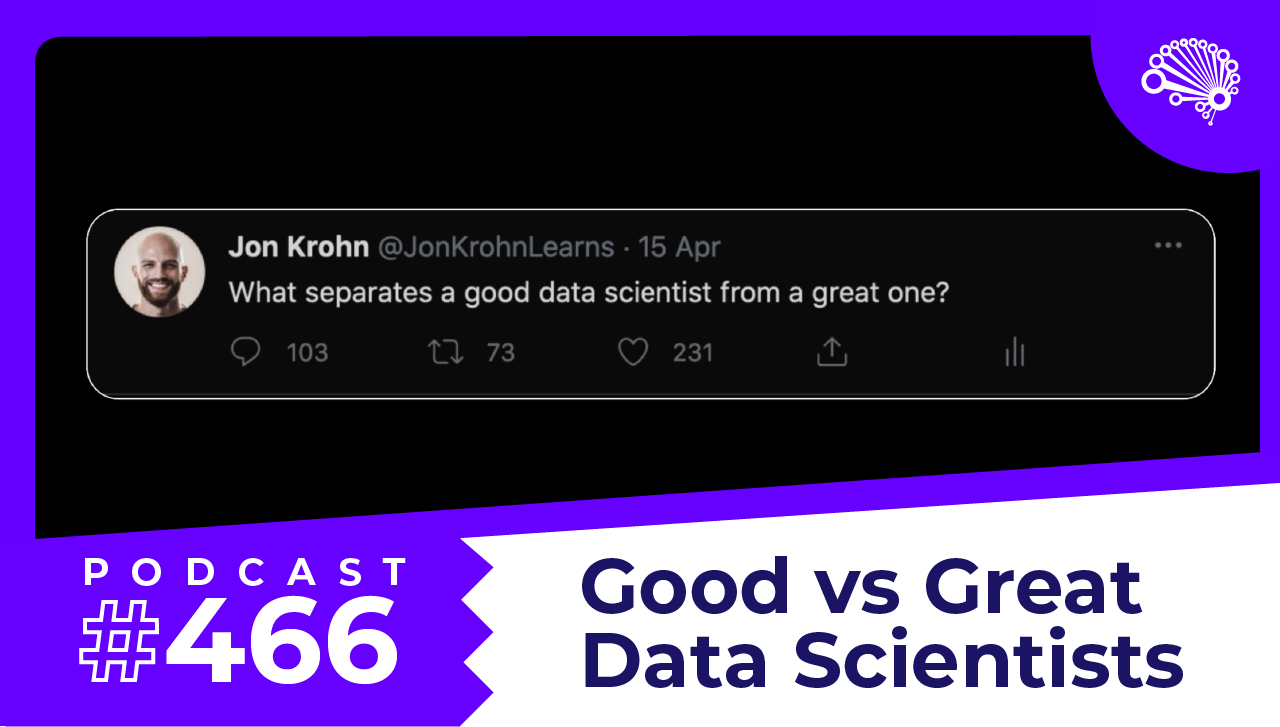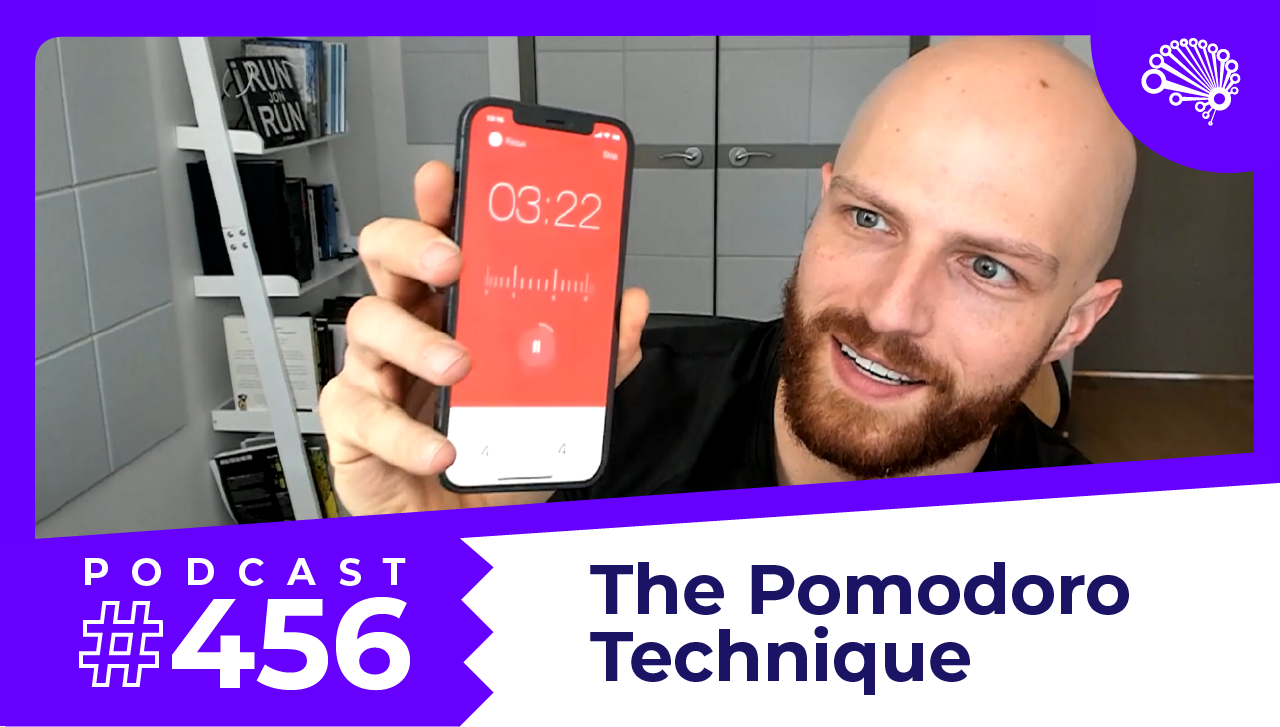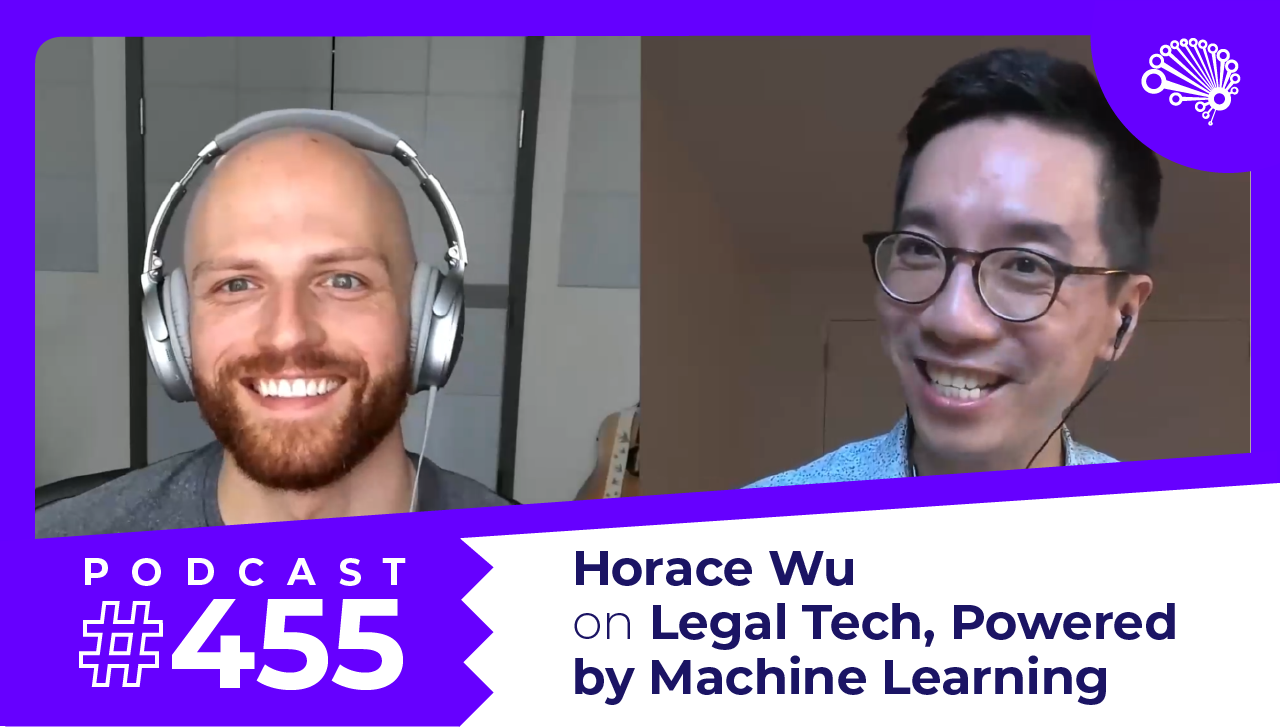"Peer-driven" learning — where you are formally taught by your coworkers — not only results in team members learning key new skills, but can have added benefits like team bonding, confidence, and innovation. Something to try!
Today's episode is directly inspired by a LinkedIn post by Laura Rodriguez. She tagged me in the post, citing a SuperDataScience episode on communication and relating it to her workplace at ForwardKeys. Thank you, Laura!
Filtering by Category: Podcast
The 20% of Analytics Driving 80% of ROI
Today’s episode is with freakin' David Langer, people!! (So obviously it's brilliant, witty, and full of laughs.) He fills us in on the most powerful 20% of analytics — the analytics that drive 80% of companies’ return on investment.
Publishing under his Dave on Data brand, Dave's YouTube channel is top-notch, with several videos that have over a million views (and the thumbnails are hilarious; check 'em out). He is an exceptionally accomplished data scientist and software engineer, including spending nearly a decade at Microsoft's Global HQ, where his titles included principal software architect, principal data scientist, and director of analytics.
Topics in the episode include:
Surprisingly powerful modeling approaches in spreadsheet tools like Excel
The SQL databases we'll need if the data sets we're working with are too big for spreadsheets
Why R programming is easy and should be our default language choice for moderate to advanced statistical analysis
How companies can maximize value from machine learning
Listen or watch here.
The Machine Learning House
In last week’s Five-Minute Friday, I discussed how, in the data science field, the learning never stops. But there’s one big counterpoint: The foundational subjects that underlie the field barely change at all, decade after decade.
These subjects — linear algebra, calculus, probability, statistics, data structures, and algorithms — build a strong foundation for your “Machine Learning House”. Today's Five-Minute Friday articulates my perspective that investing time in studying these foundational subjects will reap great dividends throughout your data science career.
You can listen or watch here.
Machine Learning at NVIDIA
This week's guest is absolute rockstar Dr. Anima Anandkumar, who's both professor at prestigious Caltech and director of ML research at NVIDIA. The episode is exceptionally content-rich but also lots of fun; Anima was a joy to film with.
In the episode, Anima fills us in on:
The cutting-edge interdisciplinary research she carries out (applying highly optimized mathematical operations to allow state-of-the-art ML models to be executed on NVIDIA's state-of-the-art GPUs)
How this blending of leading software and leading hardware enables world-changing innovations across disparate fields, from healthcare to robotics
What it's like in the workweek of a researcher bridging the academic and industrial realms
The open-source data science tools and techniques that she most highly recommends
Listen or watch here.
99 Days to Your First Data Science Job
He's BAAAAACK! Kirill Eremenko is the GUEST on the SuperDataScience show for the first time. In this episode, he details his exceptional new learning pathway that enables folks to land their first data science job in 99 days.
We also cover:
• What Kirill's been up to; life philosophies he's honed
• 5 myths holding people back from starting a data science career
• 5 items you need to land a data science job
Kirill created the SuperDataScience podcast in 2016 and hosted the program (over 400 episodes!) until passing the torch to yours truly on January 1st.
Kirill also founded the SuperDataScience company and is the firm’s CEO today. SuperDataScience.com, the namesake of this podcast, is a comprehensive online education platform for data science and related data specializations. Through SuperDataScience.com and his Udemy courses, Kirill has taught well over a million students worldwide, launching countless data science careers.
You can listen or watch here.
Learning Deep Learning Together
I'm joined today by Prof. Konrad Körding of the University of Pennsylvania, a world-leading researcher on links between biological neuroscience and A.I. He also leads Neuromatch Academy, a super cool group-based deep learning school.
Neuromatch is an innovative, hands-on program for learning deep learning that matches students with similar interests, languages, and time zones into tight-knit study teams. This matching approach is wildly successful, with 86% of students completing the program, compared to a 10% industry average.
In the first half of the episode, we go over the details of the Neuromatch curriculum, providing you with a survey of all of the state-of-the-art deep learning approaches. The second half is a mind-blowing exploration of the limits of artificial neural networks today and how incorporating more biological neuroscience may enable machines to develop artificial general intelligence (AGI) — i.e., machines that learn as well as humans do.
Listen or watch here.
The History of Data
Last month, I thought I was taking a risk by doing an episode on the History of Algebra, but it was an unusually popular episode! To follow up, today's Five-Minute Friday is on the four-billion-year History of Data — hope you enjoy it 😁
You can watch or listen here.
High-Impact Data Science Made Easy
Today, the wise Noah Gift weighs pros and cons of data science learning options (university degrees vs online certifications; full-time vs on-the-job) as well as how MLOps can quickly make you exponentially more impactful.
Noah has worked in countless technical leadership roles. He held the roles at companies ranging from tech start-ups he founded to prominent institutions like ABC, Caltech, and AT&T. Today, Noah’s founder of a consultancy called Pragmatic AI Labs — and he devises and teaches data science curricula at several of the most prestigious American universities, including Duke, Northwestern, and Berkeley. He has written eight books, including the bestselling Python for DevOps and the forthcoming Practical MLOps.
On top of all that incredible background, Noah has rich, well-formed life philosophies, which we dig into into detail. I learned a ton from him during this episode, and have been thinking about concepts we discussed time and again since filming. I highly recommend checking the episode out!
You can listen or watch here.
Good vs. Great Data Scientists
What separates a good data scientist from a great one? I asked this on Twitter recently and received hundreds of replies — some witty, others very thoughtful. For today's Five-Minute Friday episode, I review and summarize the thread.
The Tweet has had a crazy 7k engagements on 220k impressions so far — evidently it's a topic that lots of people have an opinion on. I highlighted some of my favorite individual replies in the video, including those from Martin Goodson, Chris Albon, Brandon Rohrer, Chelsea Parlett-Pelleriti, and Isabella Ghement.
What do you think? Let me know if I missed anything important!
You can listen to or watch my video summary here, or you can click through for the blog-post version.
The full Twitter thread is here if you'd like to dig through the entirety of the collective wisdom.
Read MoreAnalytics for Commercial and Personal Success
I believe the easiest way to attain success — in personal or professional endeavors alike — is to rigorously track and analyze the right data. Konrad Kopczynski is a master on this topic and he joins me for this week's guest episode.
Whether you're developing machine learning models, maximizing your company's profitability, or tackling a full-length Ironman triathlon, if you're disciplined about data collection, tracking, and reflection, you can iterate, improve, and achieve your dream state. This is a central tenet of my life and much of my ideology on it has been influenced by my near-decade-long friendship with Konrad.
Konrad is the founder and managing partner of impakt Advisors, a consultancy that specializes in harnessing data for, well, impact. They structure the various data sources into thoughtfully constructed data warehouses and then layer on top analytics, data-science models, and visualizations to enable real-time reports, dashboards, and predictions across all the key areas of a business, including digital marketing, customer retention, behavioral segmentation, and profit margin.
Listen to or watch here.
A.I. vs Machine Learning vs Deep Learning
"A.I.", "Machine Learning", and "Deep Learning" are terms that are often thrown around interchangeably. They shouldn't be! For Five-Minute-Friday this week, I define each of the three terms in straightforward language.
You can watch or listen to the episode here. Or you can expand below to read my blog post version.
Read MoreTime-Series Analysis
Matt Dancho joins me on this week's SuperDataScience guest episode, which is dedicated to time-series analysis. We cover what it is (modeling financial data and other quantities that vary over time) as well as the state-of-the-art techniques and tools.
Matt is the founder and CEO of Business Science, an educational platform dedicated to commercial applications of data science. He's a heavy contributor to open-source projects, particularly the Modeltime ecosystem of R packages he devised. Modeltime makes working with (and modeling!) time-series data both tidy and easy.
Listen or watch here!
It Could Be Even Better
When something positive happens in my life, my mind tends to jump to the negative flipside right away. To fend this off, I now repeat to myself "It Could Be Even Better" when something good happens. The mental impact has been sublime.
For this week's Five-Minute Friday episode, I provide specific examples across my professional, fitness, and personal lives where repeating this "It Could Be Even Better" mantra has proved game-changing. If you too slip into negative thinking when something good happens, perhaps it's a simple trick that'll work for you too!
Watch the video above or click through for the full post.
Read MoreMLOps for Renewable Energy
You're in for a treat with Samuel Hinton! The first half of this week's guest episode is a mind-blowing journey on our ever-expanding universe. The second half is on Machine Learning Operations and how Sam uses it to shift the world to clean energy.
Sam is a witty polymath. He's a data scientist, astrophysicist, software engineer, former Survivor contestant, beloved online instructor, and most recently a fiction writer. In his role as Data Scientist at the Arenko Group, a renewable energy company, he leads MLOps, enabling efficient experimentation and productionization of ML models.
Listen or watch here.
The History of Algebra
Algebra lies at the core of all modern data science approaches. We've been working on it for a while though — it's at least 3900 years old! For Five-Minute Friday today, I cover the Babylonian genesis of the field through to today's ML applications.
Listen or watch here.
Tackling Climate Change with ML
Vince Petaccio II joins me on the SuperDataScience podcast this week to detail how individuals in general — and data scientists in particular — can make a meaningful difference in the fight against climate change.
Particular green machine learning applications we covered include:
• Optimizing energy delivery
• Precision agriculture and vertical farming
• Identification of misinformation
• Climate modeling
Vince is a data scientist at Amazon Web Services (AWS), a sorely-missed former colleague of mine at untapt/GQR, and a brilliantly articulate advocate for climate action through his work as a volunteer lobbyist for the Citizens' Climate Lobby.
Listen or watch here.
Behind the Scenes
Today’s Five-Minute-Friday episode is a behind-the-scenes tour of a professional studio configured for filming video tutorials. Specifically, we had just wrapped filming a ~10-hour series on Probability and Statistics for Machine Learning.
I’ve been fortunate to work with Erina Sanders and Guillaume Rousseau at Production Central Studios and Stages since 2017, including on my bestselling Deep Learning with TensorFlow videos. In this video you meet Erina and Guillaume — and hear about how they make the magic happen!
You can listen or watch here.
(And yes, I know! I learned my lesson and will now film in landscape mode not portrait on my phone!) 🤦♂️
Landing Your Data Science Dream Job
This week, the inspiring Harpreet Sahota joins me on the SuperDataScience show to fill you in on how to land your data science dream job — whether it’s a more senior role or your first foray into the field.
Harpreet is an eminent contributor to the data science community. It's unbelievable how much he gives to world each week. He:
Hosts the The Artists of Data Science podcast
Is the principal mentor at Data Science Dream Job
Hosts weekly office hours that anyone can drop in on
With Kate Strachnyi, founded and hosts the inaugural (and forthcoming) Data Community Content Creator Awards
Despite all of the above, Harpreet's remarkably humble — and capital-S Stoic! Oh, and he has a day job too! He's the lead data scientist at Price Industries, a global industrial leader in HVAC manufacture, and in the episode he details for us data models he's built for them.
You can listen (or watch) here.
The Pomodoro Technique
I’ve experimented with a lot of productivity techniques and quantitatively track their effectiveness every day. One of my long-standing favorites is the Pomodoro Technique to eke creative, highly focused work out of minimal effort 🍅
You can listen to or watch today's Five-Minute-Friday episode on the Pomodoro Technique here.
In addition to Pomodoros, some other techniques I've covered on the podcast are mindfulness (here and here) and a number popularized by James Clear over the years (see here).
Legal Tech, Powered by Machine Learning
This week, Horace Wu fills us in on how to bootstrap an ML start-up — without outside capital while still earning an income! We also cover how AI can advance the legal sector and how to pivot your career from services to start-up founder.
Syntheia, the latest company Horace founded, augments human lawyers with the power of the (typically millions) of historical documents at their firm. Using a combination of NLP and machine vision (then surfaced in Microsoft Word using javascript), Syntheia provides lawyers with suggestions on tricky points in contracts and automates the generation of clauses.
Prior to founding Syntheia, Horace was an attorney at top firms in Australia and the US. At Syntheia, he works closely with his team of data scientists and developers to solve complex problems for the legal profession. Especially for a supposedly non-technical founder, he displays a stunning depth of knowledge of NLP models and full-stack model deployments.
You can listen and watch here: superdatascience.com/455





